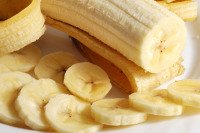Banana Nutrition Facts
Banana Health Benefits That May Surprise You

A nutritional powerhouse all packed neatly into a yellow jacket. Banana nutrition facts and great flavor have made them a favorite fruit from young to old.
Sports enthusiasts are especially fond of bananas for their source of sugars and carbohydrates. Around 23 000 bananas were eaten at Wimbledon Tennis Championship in 2009.
Bananas have a high nutritional value; A medium-sized banana provides 400 mg of potassium -11% of daily value- and contains 110 calories and 4 grams of fiber.
Banana Nutrition Facts
Here are some banana health facts which make them perfect to add to your healthy lifestyle and eating plan.
- Bananas are one of the best sources of potassium, an ingredient of paramount importance in keeping your heart and nervous system in good health. Potassium assists our body in many ways from muscular movements, it enables our muscles to contract and expand smoothly during exercises and it reduces cramps. Potassium also helps to prevent high blood pressure decreases your risk of having a stroke and helps rid us of fluid retention. A number of studies have shown the effectiveness of potassium-rich foods such as bananas in lowering blood pressure. In one study, researchers tracked over 40,000 American male health professionals over four years to determine the effects of diet on blood pressure. Men who ate diets higher in potassium-rich foods, as well as foods high in magnesium and cereal fiber, had a substantially reduced risk of stroke.
- The high potassium content of bananas is beneficial to our kidneys and bones. Potassium suppresses calcium excretion in the urine which decreases the risk of developing kidney stones as well as decreasing the loss of calcium from our body which reduces the risk of osteoporosis.
- Bananas contain tryptophan, an amino acid, which can be converted into serotonin. Serotonin has a calming affect on the brain so it acts as a mild sedative.
- Bananas are an excellent source of fiber and are easily digested. High-fiber diets help to maintain regular, smooth bowel movements. Diets that are high in fiber are linked to lower risk of coronary heart disease and of Type 2 diabetes.
- Bananas are a good source of Vitamin C. Vitamin C is an excellent anti-oxidant and protects our bodies from infections as well as assisting in the healing process. Vitamin C also enhances the body's absorption of iron
- A banana is one of the highest sources of Vitamin B6 which helps helps maintain a healthy immune system and aids in the functioning of the central nervous system. Vitamin B6 is used by the body to convert carbohydrates into glucose and maintains healthy blood sugar levels. Vitamin B6 is recommended to people who are lethargic, moody and have trouble sleeping.
- Bananas are filled with three natural sugars: sucrose, fructose and glucose. These sugars give our bodes an instant boost and helps us maintain our energy levels. There are also high levels of carbohydrates found in bananas and this is why they are popular with sports enthusiasts.
- Bananas contain a compound called fructooligosaccharide. This is known as a prebiotic because it nourishes probiotic (friendly) bacteria in the colon. These beneficial bacteria produce vitamins and digestive enzymes that improve our ability to absorb nutrients, plus compounds that protect us against unfriendly microorganisms. When fructooligosaccharides are fermented by these friendly bacteria, not only do numbers of probiotic bacteria increase, but so does the body's ability to absorb calcium.
- Bananas are a good way to alleviate heartburn as they contain natural antacids.
- Good news for smokers hoping to quit - bananas are full of vitamins B6 and B12, potassium and magnesium which all help the body recover from nicotine withdrawal and its effects.
- Bananas can also help prevent us from getting ulcers as they reduce acidity and stimulate the cells on the internal stomach lining to produce a thicker stomach lining which will protect us from the acid. Bananas contain protease inhibitors which rid our bodies of the bacteria that can cause stomach ulcers.
- Bananas are very good for babies and are often used as the first solid food given to infants. They contain almost no fat, are easy to digest and very few babies are allergic to them.
See whfoods.com for more information on banana nutrition facts.
If you'd like to get the health benefits of bananas into your diet then try adding them to a breakfast smoothie or chopping them into your morning porridge. They also freeze really well even though the skin will go black, the banana will be fine inside.
Banana Nutritional Value Breakdown:
Total Fat - 0 g
Cholesterol - 0 g
Calories - 110
Potassium - 467 mg (10% of daily recommended value)
Dietary Fibre - 4 g (16% of daily recommended value)
Sugar - 14.8 g
Protein - 1 g (2% of daily recommended value)
Vitamin C - 16% of daily recommended value
Vitamin B6 - 20% of daily recommended value
More Interesting Health Articles


